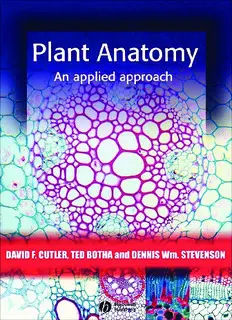
Plant Anatomy An Applied Approach PDF
Preview Plant Anatomy An Applied Approach
PLANT ANATOMY The Late Dr C Russell Metcalfe, who both inspired and taught me. (DFC) Professors Chris H. Bornman and Ray F. Evert who as teachers, mentors, and colleagues encouraged me to develop a fascination and passion to study functional plant anatomy. (CEJB) The Late Richard A. Popham who fi rst stimulated and encouraged my interest in plant anatomy. (DWS) Plant Anatomy An Applied Approach D.F. CUTLER, C.E.J. BOTHA, D.W. STEVENSON David F Cutler Honorary Research Fellow Jodrell Laboratory Royal Botanic Gardens Kew Richmond, Surrey, UK Ted Botha Rhodes University Department of Botany Grahamstown Eastern Cape Province, South Africa Dennis Wm Stevenson Vice President and Rupert Barneby Curator for Botanical Science The New York Botanical Garden Bronx, New York, USA © 2007 by David F. Cutler, Ted Botha, and Dennis Wm. Stevenson BLACKWELL PUBLISHING 350 Main Street, Malden, MA 02148-5020, USA 9600 Garsington Road, Oxford OX4 2DQ, UK 550 Swanston Street, Carlton, Victoria 3053, Australia The right of David F. Cutler, Ted Botha, and Dennis Wm. Stevenson to be identifi ed as the Authors of this Work has been asserted in accordance with the UK Copyright, Designs, and Patents Act 1988. All rights reserved. No part of this publication may be reproduced, stored in a retrieval system, or transmitted, in any form or by any means, electronic, mechanical, photocopying, recording or otherwise, except as permitted by the UK Copyright, Designs, and Patents Act 1988, without the prior permission of the publisher. First published 2007 by Blackwell Publishing Ltd Based on the publication Applied Plant Anatomy by D.F. Cutler, published 1978 by Longman. 1 2007 Library of Congress Cataloging-in-Publication Data Cutler, D.F. (David Frederick), 1939– Plant anatomy : an applied approach / D.F. Cutler, C.E.J. Botha. D.W. Stevenson. p. cm. Includes bibliographical references and index. ISBN 978-1-4051-2679-3 (pbk. : alk. paper) 1. Plant anatomy. I. Botha, C.E.J. (Christiaan Edward Johannes), 1946– II. Stevenson, Dennis Wm. (Dennis William), 1942– III. Title. QK641C867 2007 580–dc22 2007003776 A catalogue record for this title is available from the British Library. Set in 10.5 on 13 pt Janson by SNP Best-set Typesetter Ltd, Hong Kong Printed and bound in Singapore by Fabulous Printers Pte Ltd The publisher’s policy is to use permanent paper from mills that operate a sustainable forestry policy, and which has been manufactured from pulp processed using acid-free and elementary chlorine-free practices. Furthermore, the publisher ensures that the text paper and cover board used have met acceptable environmental accreditation standards. For further information on Blackwell Publishing, visit our website: www.blackwellpublishing.com Contents Preface ix Acknowledgements x Introduction 1 1 Morphology and tissue systems: the integrated plant body 4 General background 4 Adaptation to aerial growth 6 The systems in detail 9 2 Meristems and meristematic growth 14 Introduction 14 Apical meristems 15 Lateral meristems 20 Practical applications and uses of meristems 21 3 The structure of xylem and phloem 28 Introduction 28 The xylem 28 The phloem 41 S tructure–function relationships in primary and secondary vascular tissues 45 4 The root 48 Introduction 48 Epidermis 48 Cortex 49 Endodermis 51 Pericycle 52 Vascular system 53 Lateral roots 54 vi 5 The stem 57 Introduction 57 Stems – cross-sectional appearance 59 C Transport phloem within the axial system 64 o n Transport tissue – structural components 66 t e n Concluding remarks 68 t s 6 The leaf 70 Introduction 70 Leaf structure 74 The epidermis 76 The mesophyll 93 Strengthening systems in the leaf 102 The vascular system 103 The phloem 108 Specifi cs of the monocotyledonous foliage leaf 111 Secretory structures 118 Concluding remarks 119 7 Flowers, fruits and seeds 121 Introduction 121 Vascularization 121 SEM studies 123 Palynology 124 Embryology 127 Seed and fruit histology 127 8 Adaptive features 135 Introduction 135 Mechanical adaptations 135 Adaptations to habitat 137 Xerophytes 139 Mesophytes 147 Hydrophytes 150 Applications 152 9 Economic aspects of applied plant anatomy 154 Introduction 154 Identifi cation and classifi cation 154 Taxonomic application 155 Medicinal plants 158 Food adulterants and contaminants 159 Animal feeding habits 162 Wood: present day 163 Wood: in archaeology 165 vii Forensic applications 168 Palaeobotany 169 Postscript 169 C o n t e 10 Practical microtechnique 170 n t Safety considerations 170 s Materials and methods 170 Microscopy 191 Appendix 1 Selected study material 195 Appendix 2 Practical exercises 203 Glossary 242 Cited references 280 Further reading 282 Index 287 Preface Plant anatomy, the study of plant cells and tissues, has advanced considerably since the early descriptive accounts were made which consisted mainly of cataloguing what was ‘out there’. Anatomical data have been applied in the better understanding of the interrelationships of plants, and in the molecular age provide confi rming evidence of natural relationships of plant families in combined analyses. Plant physiologists need to know where certain process- es are being carried out by plants – there are particularly interesting studies on phloem loading and the transport of synthesized materials, for example. There is a long list of applications, and these are expanded on in Chapter 1. One of us (DFC) wrote a book, Applied Plant Anatomy (published in 1978), aimed at reaching students who needed to know about the anatomy of plants, but found the encyclopaedic volumes daunting. This book served its purpose well, but is now very dated and long out of print. We realized that with the passage of time, many new disciplines had been developed, and older ones expanded to a point where a much revised and up- dated book of this type could play an important part. Consequently, this vol- ume was conceived, and together with the CD-ROM which takes the study of practical plant anatomy to new levels, presents a ready way for non- specialists to learn about and enjoy the subject, at their own pace and in many places, beyond the formal constraints of the laboratory. D.F. Cutler, C.E.J. Botha, D. Wm. Stevenson
